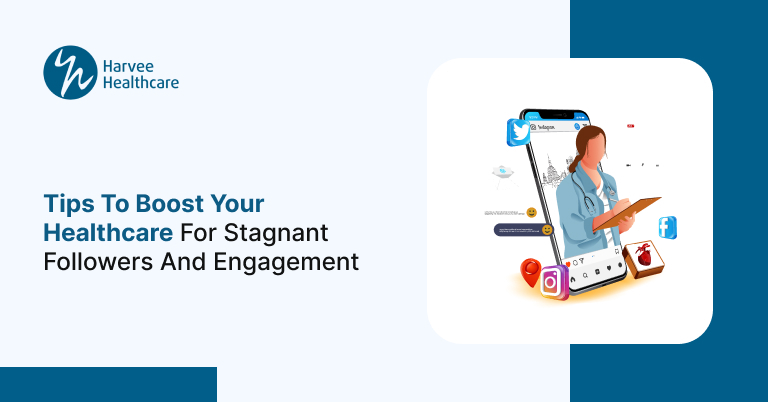
Stagnant Followers and Engagement: Tips to Boost Your Healthcare Social Media Presence
Since social media is now a part of nearly every aspect of life, companies from all sectors quickly began using it to connect with current and potential customers. Social networking sites are becoming used for more than just posting pictures and personal updates.
They have developed into powerful instruments in the healthcare industry, allowing doctors to interact with patients, educate people, and connect with colleagues.
In this blog, we will discuss how to increase your followers and engagement and also about tips and strategies for effective healthcare social media marketing.
Role of Social Media in Healthcare:
Social media is changing how healthcare professionals engage with their patients and each other, from professional connections and engagement with patients to responding to emergencies and educational opportunities.
Developing a Relationship with Patients: Given that 68% of parents look for health information on social media, medical practitioners need to be engaged in order to provide trustworthy advice.
Building Professional Connection: Social media increases networking; according to 60% of physicians, sharing research and insights on social media improves patient care.
Enhancing Awareness: It’s a useful tool for communicating scientific findings, medical advancements, and public health messages to a large audience.
Communication in Times of Crisis: Social media allows hospitals and health authorities to provide quick, real-time updates during emergencies.
The healthcare social media market grew rapidly, with a compound annual growth rate of 8.5% from 2023 to 2028. It shows a drastic improvement in attribution to patient engagement, health awareness campaigns, collaborations, and online awareness.

Source: Business Research Company
Why do Following and Channel Growth Remain Stuck?
Following and channel growth frequently stall for several essential reasons. Reduced visibility may result from inconsistent posting, such as sharing content only occasionally. A reduction in followers can result from neglecting engagement, such as failing to reply to DMs or comments.
The other reason is hashtags. Discoverability is limited when hashtags are ignored, such as when essential hashtags like #happy are used in place of more focused ones like #fitnessmotivation or #healthylifestyle.
While avoiding Instagram Stories—missing out on features like polls, Q&As, or behind-the-scenes content—can hinder you from building deeper connections, poor content, like hazy photographs or meaningless text, fails to grab attention.
How to Use Social Media to Increase Followers and Engagement?
Personalize the content:
To gain people’s trust, show your clinic is more than just a business by posting news, promotions, and health-related advice via social media. For instance, if you own a dental clinic, publish a patient success story, offer a free check-up day, or post brushing tips to engage and establish trust.
Share Educational Content:
To build credibility, make sure your social media content is factual and fact-checked. Sharing unverified information can harm your clinic’s reputation. You can publish a video outlining the advantages of consistent exercise or offer advice on how to deal with allergies during allergy season.
Promote Achievements and Accomplishments:
Post on social media the achievements of your staff members, such as honors or recognition for their studies. Showcasing their accomplishments highlights your clinic’s skills. This can establish credibility and show the significance of each employee in your hospital.
Utilize Patient Testimonials:
There is a quote that says, “Let your customers do the talking; their voices sell your business.” User-generated content about your clinic, employees, or services is highly effective since consumers are more likely to believe suggestions from others than self-promotion from businesses.
Highlight Your Brand:
Social media is an effective tool for building a strong brand and making an impact. Even though healthcare facilities have similar goals, you can highlight your distinct personality. A nutrition clinic, for instance, might offer advice on well-being and healthy living, promoting your brand and keeping customers thinking of you.

Source: Statista, eMarketer, HubSpot, Rival IQ, Google, DMA, marketresearch.biz
Benefits of Using Social Media in Healthcare:
Boost your community reputation: Social media enables open communication between healthcare organizations and diverse audiences, keeping you top of mind for patients and strengthening your image as a trusted doctor.
Educate People on Public Health Issues: Healthcare professionals should quickly and accurately inform people about the health hazards associated with seasons such as midsummer. This includes symptoms, home remedies, treatments, and therapy options.
Community Service and Fundraising: Hospitals can use social media to encourage community support and involvement while keeping audiences informed about fundraising events and activities.
Establishing Relationships with Patients: Hospitals can build trust and a feeling of community by using social media to develop meaningful relationships with both present and potential patients.
Hiring Healthcare Workers: Hospitals can use social media to showcase their facilities, culture, and commitment to patient care, attracting and keeping talented healthcare professionals.
Builds Positive Brand Image: Posts that highlight your values can improve relationships with both potential patients and staff. Although branding may be one of many things that come to mind when considering healthcare businesses, it is essential for building confidence in the interactions between patients and providers.
Social Media Platforms to Elevate Your Healthcare Presence:
Every social media platform has its pros and cons; for instance, a fitness influencer might prioritize TikTok to share workout routines, while a healthcare professional may turn to Facebook to engage with community members and share health information.
The following are some of the platforms used to promote healthcare clinics:
Facebook:
Facebook is the most extensive social media network and an excellent choice for healthcare institutions. Setting up a Facebook page allows you to post helpful information, advertise events, share updates, and interact with your community by leaving messages and comments.
Nearly all healthcare organizations maintain a presence on at least one social media platform, with the majority actively utilizing Facebook (94.41%).
Additionally, you can target particular groups on Facebook to ensure the proper individuals see your post. This is a valuable method for patients to locate the healthcare services they require.
LinkedIn:
Healthcare firms can effectively showcase their knowledge on LinkedIn. You can make connections with other professionals and possible partners by sharing educational articles, job openings, and industry insights. This broadens your network and increases your trustworthiness.
Healthcare professionals widely use LinkedIn, with 42% actively engaging on the platform.
Given LinkedIn’s preference for business-to-business (B2B) marketing, sharing newsletters and research results to demonstrate your expertise in the area works well.
YouTube:
YouTube is an effective tool for healthcare companies to create and share educational videos, patient testimonials, expert interviews, and much more. Creating a YouTube channel can help you establish yourself as an authority in your industry.
Sharing these videos on social media and displaying them on your website can expand your audience and boost interaction.
Twitter:
Companies in the healthcare sector can share current events, articles, and quick updates on Twitter, a fast-moving medium. By using hashtags and mentions, you can interact with patients, medical experts, and influential people in the field.
Twitter is a popular platform among healthcare professionals, with around 87% of physicians utilizing it for professional activities.
During events, live tweeting and discussion hosting increase participation and awareness. Twitter Spaces is an excellent medium for collaboration and community engagement since it provides features like expert panels, Q&A sessions, public health campaigns, and patient support groups.
Instagram:
Instagram is a visually focused medium ideal for sharing visually appealing content by healthcare companies. You can display patient success stories, fitness advice, health infographics, and behind-the-scenes photos.
Instagram is experiencing growing healthcare engagement, with over 4.5 billion likes on healthcare-related posts every month.
Instagram Stories provides excellent choices for sharing interesting films that improve followers’ experiences. It works particularly well for campaigns raising health awareness because it helps establish trends and generate pertinent hashtags.
What are tools used for Healthcare Social Media Marketing?
There are plenty of tools used in social media management for marketing and advertisement campaigns. The following are a few tools that are frequently used in designing and optimizing campaign performance.
- Canva: It is a user-friendly design platform
- Figma: It is also a design tool used to design posters and much more.
- Buffer: It helps to analyze social media engagement
- Freepik: It is a platform used for free graphic resources
- Hootsuite: It is a tool that helps in simplifying social media scheduling.
Bottom Line:
Social media is a powerful instrument for healthcare business owners looking to expand their reach, connect with new audiences, and gain the trust of potential clients.
It’s not easy, but it’s not impossible. Take one step at a time and contact us, the best healthcare social media marketing company, to build a strong online presence.
Search
Recent Post
Categories
- AI in Healthcare
- Content Marketing
- Dental
- dental Digital Marketing
- Google Ads
- Google my business
- Healthcare marketing
- Healthcare SEO
- Internet Marketing Tips
- Lead Generation
- Local SEO
- Patient Satisfaction
- pay per click
- Pharma Marketing
- Social
- Social Media Marketing
- Traffic
- Website
- Website Designing
Contact
Get in Touch With Us
Coimbatore Address
- 21/1, Periasubbanna Gounder Street, K.K.Pudur, Coimbatore, Tamil Nadu 641038.
- 098942 76263
- info@harveehealthcare.com

Copyrights © 2025 harvee.co.uk














Leave a Reply